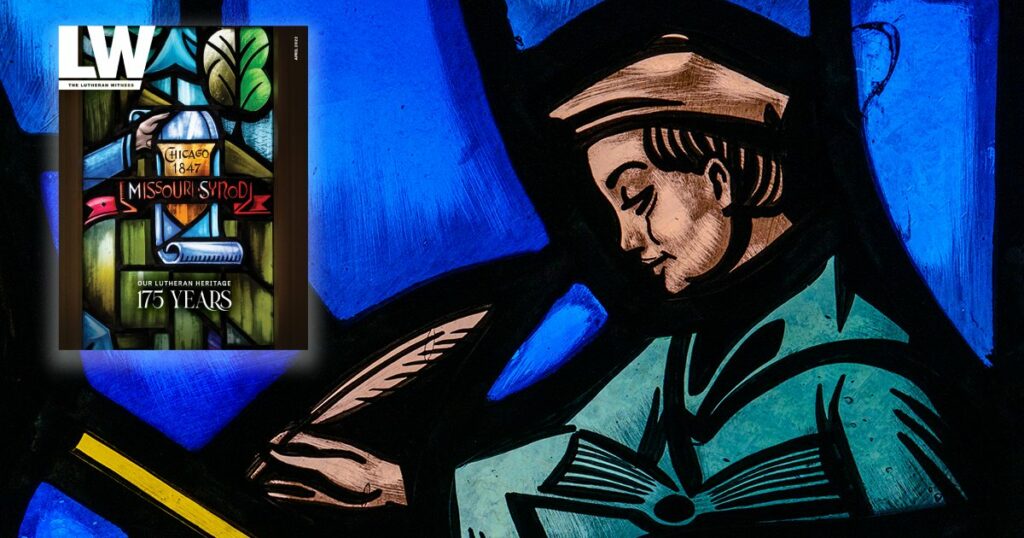They do not believe; they do not behave; they do not belong. Amid our widespread cultural collapse, it is not surprising that the growing number of religiously unaffiliated — the Nones — claim no faith (belief), no attendance (behavior) and no church membership (belonging). Pew Research Center discovered, however, that although they may not behave or belong, two-thirds of Nones indicate they believe in some sort of god.
Their belief stems from the human need for identity, meaning and purpose. As they faced remote work, fragmented families, online church, heightened skepticism and social media bombardment, they discovered their need for a place to belong and an understanding of how to live within that context. Our Lutheran faith and traditions offer depth and distinction to a world desperate for identity, meaning and purpose.
According to the General Social Survey, Nones are four times more likely to change their religious affiliation, and Barna has revealed that one in five Millennials — who make up the largest percentage of Nones — are moving toward liturgical traditions. These patterns are anecdotally observed in the small but growing interest in Roman Catholicism and Eastern Orthodoxy. Yet, as searching souls seek solace in liturgical churches, many are unaware of Lutheranism and our ancient roots.
Historical Lutheran faith
Lutherans need to recognize and appreciate how our historical faith draws “from Scripture and the orthodox Ancient Church” (see Appendix A: Catalog of Testimonies, Book of Concord [CPH, 2006], 623–48; or visit bookofconcord.org). The Lutheran church did not “appear” in the 16th century, rather it continued the tradition of proclaiming the apostolic word and creeds. Even today, in our study of the Word, we convey our need for a Savior as well as God’s forgiveness, life and salvation in Christ. Within our liturgical worship, we praise God with dignity and reverence. As God gives Himself to us in His Sacraments, we join with the saints across the ages. In days of constant flux, our ancient Lutheran faith offers a comforting and compelling stability.
Contemporary society vacillates between obsession with the materialistic and utilitarian, which are mired in the here and now, and rejection of the physical and material. On the one hand, it rejects the soul or any sort of spiritual existence; on the other hand, it affirms that you can do whatever you like sexually, regardless of physical reality. You can abort or euthanize without qualm; you can change your “gender identity.” In contrast, the Lutheran faith asserts the importance of the physical as a critical component of God’s creation, one which He declared good and through which He works.
Lutheranism celebrates the physical in relation to the spiritual in several ways. Our worship is incarnate. Our Sacraments contain visible elements. Our Lutheran liturgical and sacramental life elevates the focus from the tangible toward transcendence, shifting the attention from us to God, and synthesizing that focus with physical and material meaning and intention. This focus on Christ and His work grants our souls a depth to life for which we desperately yearn, filling our lives with identity and meaning.
Masks of God
Many people today also seek purpose. They attempt to find it in activities such as service, tolerance and economic justice. However, apart from an active and living faith in Christ, such activities will ultimately ring hollow. Jesus said, “Whoever abides in me and I in him, he it is that bears much fruit, for apart from me you can do nothing” (John 15:5). Serving others is the heart of the doctrine of vocation. Within our vocations, we both serve and are served. Luther referred to this as our “masks of God.”
Through our everyday relationships, in most of the hours of our day, we serve others. Human nature looks to what we “do” for significance. Yet the good works we walk in are not ours, but God serving others through us. The doctrine of vocation can help the Nones find purpose in their service to others.
Our faith is about being, not just doing. The world is on a treadmill of doing — there are never enough hours in the day; things are never good enough. Our Lutheran faith is a way of life and a state of existence. God serves us, instead of being about what we have done or how we have lived. And because of His love, our lives spill over in good works for the neighbor.
Thanks be to God. Both within our vocations and within our worship, God serves us, which is in stark contrast to the worldly “earn and deserve” method for acquiring something. He does not need our worship. He does not need our attendance. Instead, He serves us. We simply give thanks. Helping others understand the passive reception of God’s good gifts through the Divine Service comforts us in a world that obsessively focuses on accomplishment to provide identity.
The Lutheran faith offers identity, meaning and purpose by pointing us to Christ. It offers an ancient, timeless perspective; value through vocation; and the blessing of being served. Abiding in God’s blessings and grace is compelling and offers the Nones — and all of us — a framework for a life worth living.






RE: “Instead, He serves us.”
And yet the Bible says to us: “Serve the Lord with gladness! Come into his presence with singing!” (Psalm 100:2 ESV)
The Bible also tells us that in the world to come, the redeemed of the Lord shall “serve him day and night in his temple.” (Rev. 7:14-15 ESV)
Such worshipful service is not about bringing God what He needs (Acts 17:25);
it is about bringing Him what He is worthy of receiving (1 Chron. 16:29).
It is not about trying to demonstrate the worth of the one who is worshipping,
which would manifest one’s own vanity and ignorance (Matt. 15:8);
it is about gratefully acclaiming the One who is worshipped,
who has gloriously manifested His own divine grace and truth (John 1:14).
When Jesus said that He “did not come to be served, but to serve” (Matthew 20:28), He was conveying that His purpose was not to aggrandize himself from people’s sacrifices, but to sacrifice Himself out of love. Yet Jesus is our Lord and Teacher (John 13:14), and although He did not come to acquire gifts, surely He was and is still pleased to receive them (Matt. 2:11, Luke 7:38).
It would be interesting to get a perspective from the group this article reflects – “none”. How insightful it would be for a person to share their point of view, providing insight and (perhaps) opportunities for our understanding/creating an approach.
Jonah,
I agree entirely. We put out a request for contact with someone from this group, and had no responses. If you have someone in mind who would be willing to contribute, please send them our way. We would definitely want to have a conversation with him or her.
The major problem with all of this, even the broad generalizations I make in this article, is that the group is not monolithic. Probably the key fundamental principle is that each person’s religious belief is unique and individual. So, what one None might disagree with in this article, another one might agree with some or all of it. It largely depends on each person.
Regardless, we’re open to have the conversation.